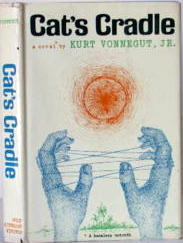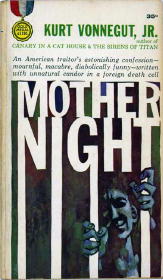Thu 12 Apr 2007
Obituary: KURT VONNEGUT, JR. (1922-2007)
Posted by Steve under Authors , Crime Fiction IV , Obituaries / Deaths Noted , Personal NotesNo Comments
Kurt Vonnegut died yesterday at the age of 84. In many ways, he was the Mark Twain of our time, and there are many other websites which will discuss his life, his writings, and his awards and accolades. What follows in this blog entry will be less an obituary, however, than a personal note or two about the author, no more or no less.
Back in the mid-1960s, I responded to a poll in a science fiction fanzine which wished to know my Top Ten SF novels. I remember only my top two choices, Number One on my list being The Man in the High Castle by Philip K. Dick, which won the 1963 Hugo award for Best Novel of the Year.

Number Two was Cat’s Cradle, by Kurt Vonnegut, Jr. Thinking about the book as soon as I heard the news last evening about Mr. Vonnegut’s death, I realized that besides being about the mysterious substance “ice-nine,” a dangerous alternative form of water, I no longer remember very much else about the book. I probably do not remember the details of very many other books I read 40 to 45 years ago, but no matter; this realization is jarring, and it means that I shall have to do something about that.
From the Wikipedia page for Mr. Vonnegut, I have excerpted the following passage:
* The Sirens of Titan: A
* Mother Night: A
* Cat’s Cradle: A-plus
* God Bless You, Mr. Rosewater: A
* Slaughterhouse-Five: A-plus
* Welcome to the Monkey House: B-minus
* Happy Birthday, Wanda June: D
* Breakfast of Champions: C
* Slapstick: D
* Jailbird: A
* Palm Sunday: C
That the author gave himself an “A plus” for Cat’s Cradle reassures me somewhat, that as a critic at the young age I was at the time, my judgment on a book’s worth was not entirely lacking.
Very soon after writing Cat’s Cradle, Mr. Vonnegut declared himself not a science fiction writer, as I recall, nor (I suspect) did he ever consider himself to be a crime fiction writer. But one of his books, Mother Night (Gold Medal s1191, paperback original, 1962) is included in Crime Fiction IV, by Allen J. Hubin.

I have to confess that I’ve never read the book, and my records reveal that I do not even own a copy. Nor do I remember the movie made from it, a 1996 film starring Nick Nolte, Sheryl Lee and Alan Arkin. It seems to have come and gone having made impression on me whatsoever. Whether this was due to a limited release to a diminishing number of “art” theaters in the country, or my own lack of attention, I do not know, but once again, here is a situation that I see needs remedying.
I’ve tried to understand the detailed synopsis of Mother Night which I found on Wikipedia, but perhaps Mr. Vonnegut’s are too complex to be summarized in a short detailed synopsis. Either you write a book about one of his books, or you try not at all. Or maybe you resort to only one line – this one, perhaps, from the IMDB page for the movie:
One thing I’m sure of, or maybe it’s two. Mother Night was certainly not a typical Gold Medal book, nor was Kurt Vonnegut, Jr., a typical American author.